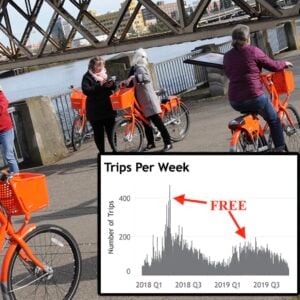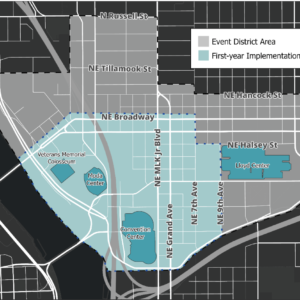The most important and respected book on parking policy and urban development is being re-published in paperback with a new preface and afterword by author Donald Shoup. See details below…
The High Cost of Free Parking
The book that started the parking revolution is now available in paperback with a new preface and afterword from the author.CHICAGO— The book that started cities rethinking free parking is back. The High Cost of Free Parking by Donald Shoup, FAICP, is now available in paperback with a new preface and afterword by the author highlighting parking policy improvements since the book was first published in 2005.
Published by the American Planning Association, The High Cost of Free Parking was the first book on the economics and politics of parking. In the book, Shoup shows how so-called “free” parking is devastating U.S. cities— from the cost of subsidizing off-street parking to increasing traffic congestion and distorting urban landscapes.
Sparing no one when attacking what he calls “wrong-headed” parking policies, Shoup is a UCLA professor who has spent 35 years studying the impact our cars have when we aren’t driving them. He reports that in 2002, the subsidy for off-street parking was between $127 billion and $374 billion, more than the U.S. spent on Medicare that year.
To correct these parking policy problems Shoup advocates three things:
Setting the right price for curb parking. Cities can use performance pricing to vary meter rates according to proximity, time of day, and day of week to achieve about an 85 percent occupancy rate. This would mean one to two curb spaces would remain vacant throughout the day on a given block. Washington, D.C. and Seattle, Washington, are testing performance parking policies, and San Francisco has implemented SFpark that automatically monitors parking demand and adjusts prices monthly.
Return parking revenue to pay for local public services. Shoup argues that drivers will be more willing to pay higher meter rates if cities return the money directly to the metered district (not into the city’s general fund). The money can be used to increase local public services in the district. Pasadena, Redwood City, San Diego, and Ventura, California, return some or all of the meter revenue to pay for added public services in the metered districts. So do Austin, Texas, and Washington, D.C.
Remove minimum parking requirements. According to Shoup, most cities erroneously view their parking problems result from a shortage of spaces, not from underpricing. He estimates that required off-street parking accounts for one-third of the cost of a typical new office building. Shoup suggests allowing in-lieu fees by allowing developers to pay a fee in lieu of providing the required number of parking spaces. Another option is for cities to reduce the demand for parking through transit incentives. Since 2005, Shoup estimates that at least 129 cities have removed off-street parking requirements in their downtowns.
Shoup writes that everyone pays for subsidized parking in countless unseen ways. Most commercial buildings are required to provide a parking lot bigger than the building itself. Restaurants are usually required to provide a lot three times larger than the building. As a result, even customers who come without a car pay for parking indirectly in higher costs for goods or services.
These parking policies not only distort urban landscapes but also present a host of consequences including higher housing prices, extreme automobile dependence, extravagant energy use, rapid urban sprawl, social inequity, economic stagnation and environmental degradation.
Americans take free parking for granted, which helps explain its ubiquity and its sheer magnitude as a land use. Shoup estimates there are between three and four parking spaces for every car in the U.S., or between 705 million and 940 million spaces. If all of U.S. parking spaces were combined into one surface lot, it would require as much land as the state of Connecticut.
Shoup writes with humor. He makes his points using excerpts from songs, TV programs, and newspaper stories with parking references. New York Press called the hardcover edition “beach reading.” Shoup’s work to reform parking policies has even inspired a devoted Facebook group who has dubbed themselves the “Shoupistas.”




